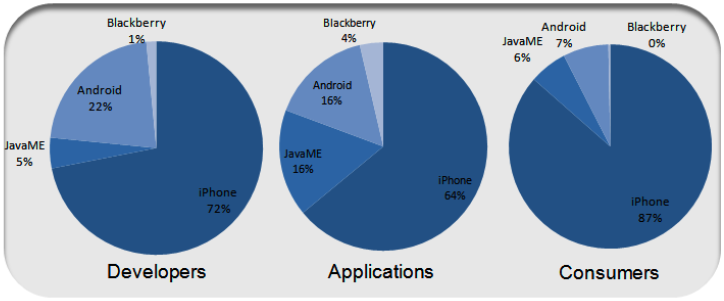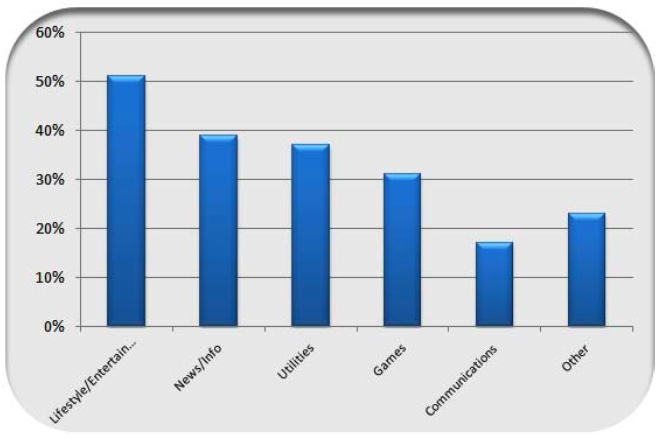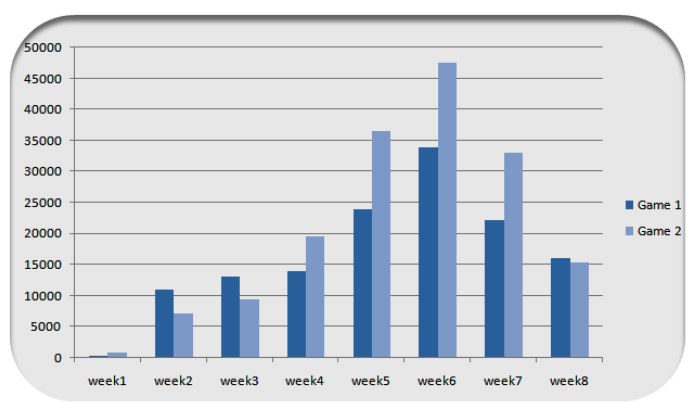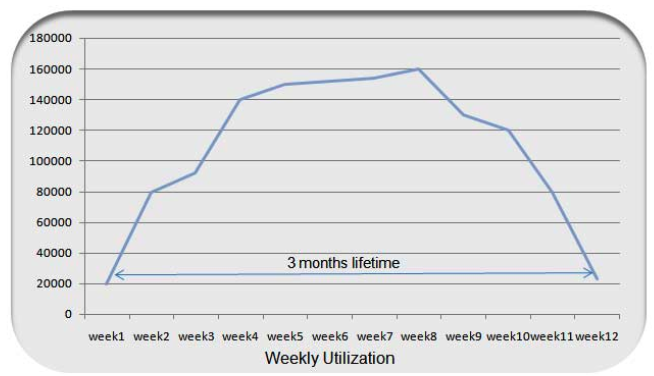A Flurry Of Market Data

What can a sampling of 100 applications and 8-million consumers on four platforms tell us about the smartphone application market?
The mobile analytics firm Flurry crunched the numbers; we’ll highlight the results:
Platform
There are three numbers that matter for smartphone application platforms: (1) number of developer on a platform, (2) number of applications for a platform, (3) the platform’s market-share.

A pair of observations:
1. Android developer- and application-numbers are disproportionally high compared to its market-share. Hypothesis: In a way, because of its openness, Android is the hacker’s (positive connotation) platform. This attracts developers. Unfortunately, the market-share number isn’t significant enough to move Apple to be less restrictive.
2. Blackberry app usage doesn’t commandeer a pixel-wide swath in the graph; I’ll be keeping this chart at the ready to dissuade prospective contract customers interested in supporting both iPhone and Blackberry.
Daily Application Category Usage

If you want to correlate usage and downloads, you could try to pair this data with the downloads survey-data from by Compete, reported here earlier.
The Games Segment
Flurry didn’t attempt a full market analysis on the game segment. Instead, they provided sales and lifecycle data on on a pair of paid puzzle games whose whose free/lite counterparts reached the #1 overall app ranking.

Downloads
Neither of the apps are $0.99 games: Game 1 sells for $2.99, Game 2 for $5.99. The former made over $450,000 in eight weeks; the latter topped $1,050,000 in eight weeks.
Finally, they provide some additional evidence to the common wisdom that a game’s lifetime is about three months:







> Blackberry app usage doesn’t commandeer a pixel-wide swath in the graph; > I’ll be keeping this chart at the ready to dissuade prospective contract
> customers interested in supporting both iPhone and Blackberry.
Flurry’s site says “We’re starting with Java ME, iPhone and Android, but look for Blackberry, Symbian and Windows Mobile soon” so that conclusion is possibly flawed. It also means that these figures are at best a comparison of those three platforms and not reliable market information. The picture they paint of iPhone being head and shoulders leader in the installable apps market probably is true but not actually news.
My naive view is that we’re comparing pears to pumpkins. Kind of we’re getting early data but there is too much noise at this time to extract clear trends …
Some personal observations (I own and use both iPhones and Blackberry devices but have no experience with the other platforms. I have previously owned Palm products but with no intention of repurchasing one.)
Blackberry users tend to use them primarily for business (my observation from asking people on planes, in airports, and at coffee shops so while I may have met sampling theory requirements, the survey was not designed to be scientific) and presently limit cross over to leisure applications. I don’t use my iPhone for email because of the enterprise server requirements imposed by IT, I want a real keyboard and a myriad of other reasons. I do use my iPhone for complementary activities such as music, videos, and fun graphic activities that I probably will never attempt to do on my Blackberry due to the screen. I do use my Blackberry for voice assisted navigation for which I (“happily” pay my supplier a monthly fee). And despite some early adopters and technology enthusiasts, I’m not seeing a huge penetration into RIM’s business market by Apple (IT department resistance, closed system, no keyboard and potentially seen as a non-essential item by management compared to traditional tools, Displacement sales are long cycle and high cost.)
I wonder about the impact of the demographics of the developers on the respective platforms. My feeling is that the majority of the iPhone developers have visions of quick riches and aren’t solving real problems. It also feels like that don’t have insight or don’t care about the problems that I seek to solve with my Blackberry. And I suspect that the RIM crowd are more business types and seek to provide a different set of solutions. No proof though. In my opinion and with my apologies to those who do use rigorous product specification, development and marketing processes marketing basics. They seem to be non existent following more of a ‘spray & pray’ technique when applied to the iPhone. I have the feeling that iPhone developers are charging low prices because (1) – they don’t need to make a living from selling applications because it is supplemental income or because of age & (2) – the often proven wrong sales/marketing approach “…if I can sell an application to x% of the Chinese/Indian/iPhone/etc market…”.
I wonder if Apple’s strategy is start by building a base user community with their loyal fans and trying to move into the business space using their K-12 approach (hook them young and they will ask for the infrastructure as they move into the business space). And RIM is starting with their business users and trying to move to non business users while fortressing themselves against competitors such as Apple etc. I don’t expect RIM to allow $0.99 pricing behavior on their applications. But I’m certainly not privy to their real strategies. Different markets with different buying behaviors and needs.
I think that these are early days and that each of the players have goals and initial strategies but that these strategies are evolving with inconclusive results and data at this juncture. Although I don’t do business development or marketing in this space I wonder if pricing so low is sustainable. Personally, I believe that if one doesn’t believe that one’s application has value, why should I? I’m happy to pay a higher price, even a monthly subscription for a value-added product. If I develop on any of the mobile platforms it will be to solve a problem for which I expect a fair return on my time otherwise it is better to invest my time/resources in other areas. HOWEVER I’m not giving up on iPhone or Blackberry at this time.
A bit longer than I planned. Just a consumer and a business person with a vested interest